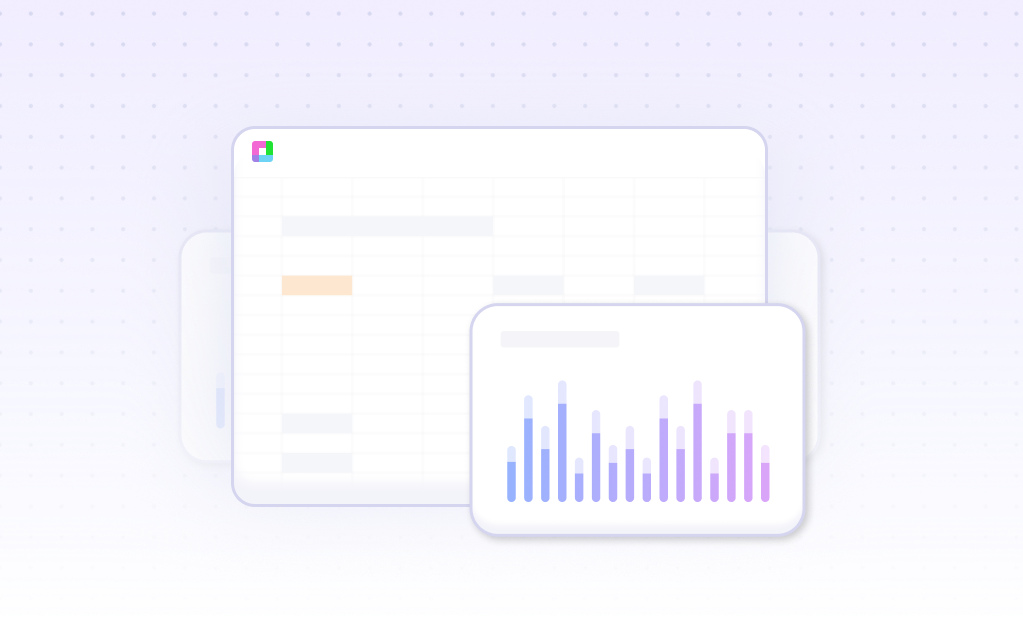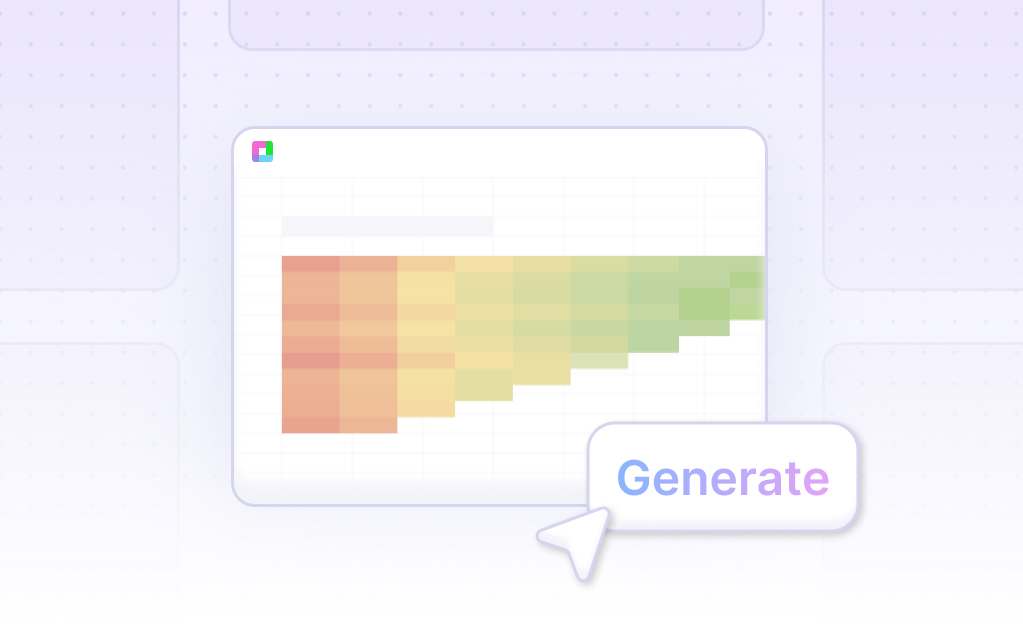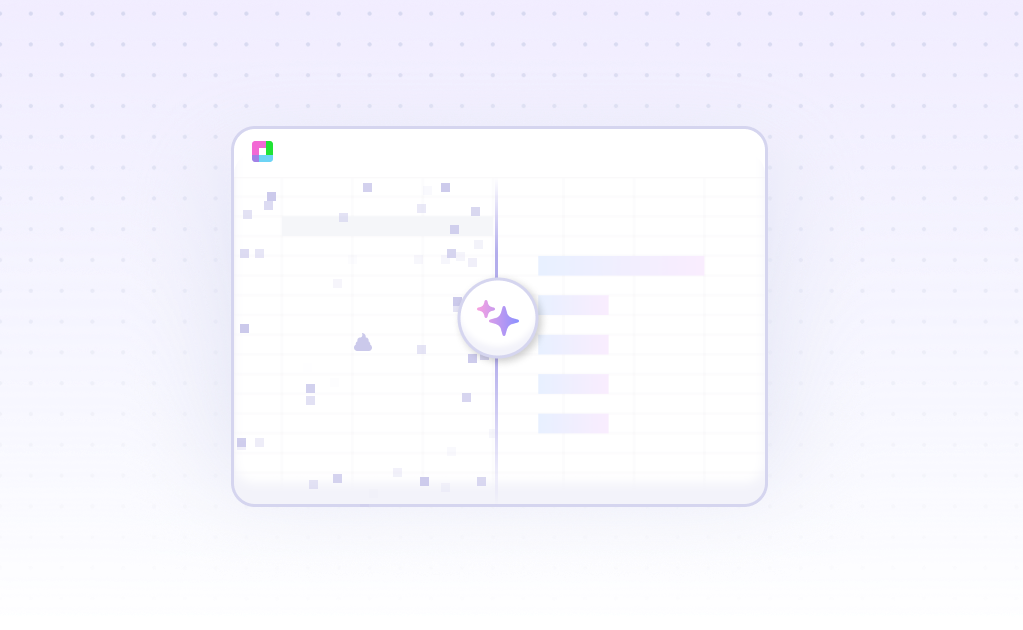
Generate a 3-D Pie Chart with AI
Create custom 3-D Pie Charts with Sourcetable AI. Generate data from scratch or upload your own to get started.
Introduction
Creating a 3-D Pie Chart can visually enhance the presentation of your data, whether you are using advanced AI tools like Sourcetable or traditional spreadsheet programs such as Excel or Google Sheets. Sourcetable simplifies this process with its AI-powered spreadsheet capabilities, allowing users to quickly generate charts with the help of an AI spreadsheet assistant.
This assistant offers guidance in crafting numerous spreadsheet elements, including comprehensive charts and graphs. For those less familiar with AI tools, generating a 3-D Pie Chart in standard spreadsheet programs is also a straightforward process, which involves manual input and customization.
To start creating dynamic 3-D Pie Charts with ease, or to continue learning about how to effectively utilize either AI-enhanced or traditional methods, sign up for Sourcetable to generate your first 3-D Pie Chart.
See how easy it is to generate 3-D Pie Chart with Sourcetable

What is a 3-D Pie Chart?
A 3-D Pie Chart is a circular graph that displays data information visually. It features arcs connected to the center of the circle with radial lines, dividing the pie into slices.
Structure and Aesthetics
The radial lines in a 3-D pie chart create distinct slices, representing different data classes. The depth of the 3-D pie chart adds an aesthetic layer, making the chart more visually appealing.
Representation of Data
3-D Pie Charts are effective in showing the relative percentages of various data categories. They allow users to visually check the correctness or reasonableness of their calculations. The size of the circle can be adjusted to reflect the overall value it represents.
When to Use a 3-D Pie Chart
Pros of Using a 3-D Pie Chart
A 3-D pie chart effectively visualizes part-to-whole relationships. It adds a layer of depth, making categories more distinguishable. It is visually appealing and can grab attention in reports and presentations.
Cons of Using a 3-D Pie Chart
Despite its appeal, a 3-D pie chart can distort perception. Depth can cause slices to appear larger or smaller than they are. Complexity increases with more slices, making interpretation difficult.
Comparison with Other Charts
Compared to 2-D pie charts, a 3-D pie chart offers more visual interest but can reduce accuracy. Bar charts provide clearer comparison between categories. Line charts are better for showing trends over time. Consider the audience and data specifics when choosing the chart type.
How to Generate a 3-D Pie Chart with Sourcetable
- Generating a 3-D Pie Chart with Sourcetable, an AI-powered spreadsheet, is straightforward and efficient. The easiest method involves using Sourcetable's AI assistant. Follow these steps for optimal results.
- First, create sample data using the AI assistant or upload your data via a CSV file. Next, select the range of data you wish to visualize. Ask the AI assistant to generate the 3-D Pie Chart. This process is similar to creating charts in Excel or Google Sheets but is much simpler using Sourcetable's AI capabilities.
- Once your initial 3-D Pie Chart is generated, you can use the AI assistant to make further refinements. Specify changes to formatting, labels, or any other aspects you wish to improve. This iterative process ensures your chart meets your precise data visualization needs.
How to Generate a 3-D Pie Chart in Excel or Google Sheets
Create a 3-D Pie Chart in Excel
To create a 3-D pie chart in Excel, begin by opening Excel. Enter your data into a table with appropriate column labels. Select the entire table.
Navigate to the 'Insert' section, locate the 'Pie Charts' option under the 'Charts' sub-section, and select the desired 3D pie chart from the available options. Excel will convert your data into a 3-D pie chart automatically.
Create a 3-D Pie Chart in Google Sheets
For creating a 3-D pie chart in Google Sheets, open Google Sheets and input your data. Organize your data with clear category labels. Select the data you want in your pie chart.
Click on 'Insert' from the top menu and choose 'Chart' from the drop-down. In the 'Chart Editor', go to 'Setup' and change the chart type to '3-D Pie Chart'. Customize the appearance if needed, then click 'Insert' to add the pie chart to your document. Resize or reposition as required.
Use Cases for 3-D Pie Chart Data Visualization
Market Share Analysis |
3-D Pie Charts are ideal for visualizing market share distribution among competitors. The 3D aspect adds depth, making it easier to distinguish between segments and perceive relative proportions effectively. |
Sales Performance Evaluation |
Visualize sales performance across different regions or segments with a 3-D Pie Chart. It highlights disparities and trends, aiding in quick decision-making and strategy adjustments. |
Budget Allocation Review |
A 3-D Pie Chart helps in reviewing budget allocation across various departments. The vivid representation allows for better understanding of funding distribution and identifying areas needing reallocation. |
Customer Demographics Exploration |
Utilize 3-D Pie Charts to explore customer demographics data, such as age groups or income levels. The three-dimensional view enhances clarity, making demographic patterns more evident. |
Product Line Comparison |
Compare the performance of different product lines with a 3-D Pie Chart. This visual distinction enables stakeholders to quickly grasp which products are performing well and which are underperforming. |
Resource Utilization Assessment |
Assess resource utilization in projects using 3-D Pie Charts. By visualizing data in three dimensions, it becomes simpler to see how resources are being used and identify potential bottlenecks or inefficiencies. |
Frequently Asked Questions
Why are 3D pie charts often criticized?
3D pie charts make interpreting data more difficult, distort data reading, and create large errors in reading data.
What are the main disadvantages of using 3D pie charts?
Three-dimensional pie charts may be difficult to read if there are too many pieces of data, have problems comparing data sets, and readers may draw inaccurate conclusions.
Why do people still use 3D pie charts despite their issues?
People like 3D pie charts because they prefer round shapes over jagged bar charts and they are often used to improve aesthetics.
What should be used instead of a 3D pie chart for comparing similar values?
A bar chart should be used instead of a 3D pie chart when comparing similar values.
Are there any alternatives to pie charts for comparing multiple groups?
Yes, stacked bar charts are a good alternative to pie charts for comparing multiple groups.
Conclusion
Throughout this guide, we've explored what a 3-D Pie Chart is, highlighting its utility in visualizing data effectively. We've detailed the process of generating these charts using AI-powered tools like Sourcetable, as well as traditional methods with spreadsheet programs such as Excel and Google Sheets.
Sourcetable simplifies the process with its AI spreadsheet assistant, enabling users to create charts effortlessly. This makes it an excellent choice for those seeking to enhance their data presentation without needing extensive technical knowledge.
To experience the seamless integration of AI in spreadsheet management and begin creating your 3-D Pie Charts with ease, sign up for Sourcetable.
Recommended Guides
Connect your most-used data sources and tools to Sourcetable for seamless analysis.
Frequently Asked Questions
If your question is not covered here, you can contact our team.
Contact Us




